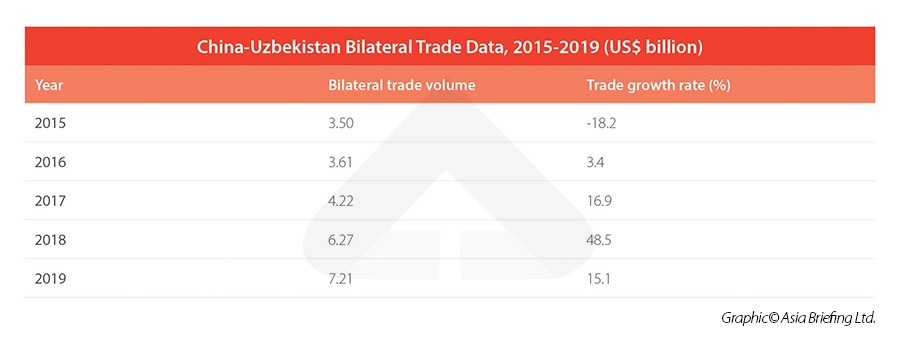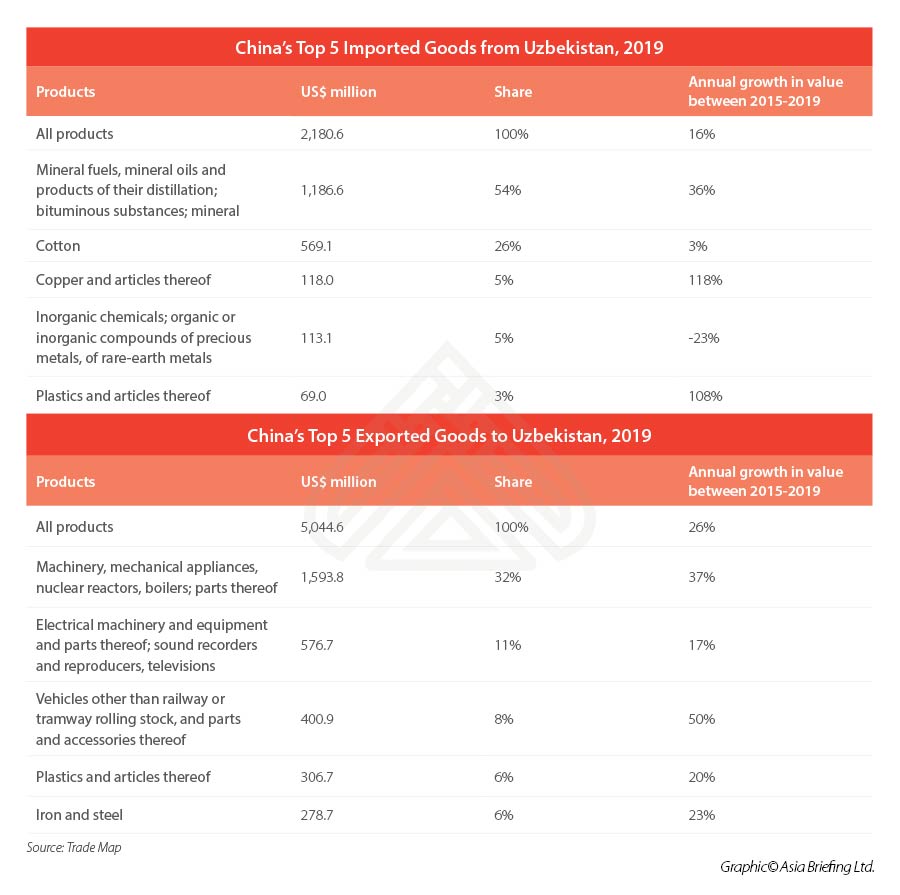China-Uzbekistan: Bilateral Trade and Future Outlook
As an important country along the ancient Silk Road and the new Silk Road Economic Belt, Uzbekistan is the first among the five Central Asian countries to establish formal diplomatic relations with China. Over the past 20 years since the establishment of diplomatic ties, bilateral cooperation in various fields between Uzbekistan and China has been advancing smoothly. In June 2016, China-Uzbekistan relations were officially upgraded to a comprehensive strategic partnership.
China-Uzbekistan relations
China and Uzbekistan established diplomatic ties in 1992 following the collapse of the Soviet Union. Since then, the two countries have maintained strong ties and reached several diplomatic milestones. Uzbekistan joined as a founding member of the Shanghai Cooperation Organization (SCO) in 2001, a regional economic and security alliance that today is made up of China, Russia, Kazakhstan, Tajikistan, Kyrgyzstan, Iran, India, and Pakistan.
In 2005, China and Uzbekistan signed the “China-Uzbek Treaty of Friendship and Cooperation”, a bilateral treaty containing several initiatives, including cooperation on the economy, trade, counterterrorism, and anti-drug trafficking, among other measures.
With the launch of the Belt and Road Initiative (BRI) in 2013, Uzbekistan has become a strategic geopolitical partner in the region. Although the two countries don’t share a border, Uzbekistan’s location places it right in China’s path to Turkmenistan to the west, a major source of natural gas. The Central Asia-China Pipeline passes through Uzbekistan to connect Turkmenistan’s gas supply to China’s grid in the western region of Xinjiang.
In addition, Uzbekistan’s proximity to the Caspian Sea makes it a viable corridor opening trade routes to the Persian Gulf and Black Sea ports. Uzbekistan itself also supplies a significant amount of natural gas to China, as well as other commodities, including cotton and inorganic chemicals.
China-Uzbek relations began to pick up speed with the appointment of President Shavkat Mirziyoyev in 2016. The significant market liberalization and economic reforms implemented by the new president have made the country one of the five fastest growing in the world, giving a boost to bilateral ties as China’s goals for regional development align with Uzbekistan’s economic ambitions. It has also made the country increasingly investor-friendly and more welcoming of Chinese investment than some of its neighbors.
China’s relationship with Uzbekistan has therefore perhaps been the most fruitful among the Central Asian countries, with both countries actively cooperating in a myriad of fields from infrastructure development to scientific research.
In 2020, Uzbekistan upped the number of visa-free days Chinese citizens could enjoy in the country from five to seven to facilitate travel and tourism in the country. The two countries have also deepened cultural exchange. Uzbekistan was the first country in the world to open a Confucius Institute, a Chinese language and cultural institution, and centers for the study of Uzbek language and culture have been set up in Chinese universities.
China’s relationship with Uzbekistan benefits from a mutual desire for bilateral trade, regional development, and stability. Moreover, as Uzbekistan is geographically removed from China’s immediate vicinity, it is also spared from handling some of the major issues that plague relations between China and other Central Asian countries, most notably security concerns at the borders.
However, bilateral trade and cooperation are inseparable from wider geopolitical realities. Difficulties establishing secure and efficient trade routes through intermediary countries, such as Kyrgyzstan and Tajikistan, may hamper trade with Uzbekistan and other countries further west.
For example, the Uzbekistan-Kyrgyzstan-China Transport Corridor, a trade route planned for transporting cargo between China and Uzbekistan currently still relies on trucks for the portion of the route running across the Kyrgyz border, despite there being working railways on both the Chinese and Uzbek sides. Such issues will need to be ironed out if long-term sustainable trade in the region is to be maintained.
Foreign investment in Uzbekistan
According to the State Committee of the Republic of Uzbekistan on Statistics, total foreign investment and fixed asset loans reached UZS195.9 trillion (Approx.US$18.3 billion) in 2019. The foreign direct investment (FDI) in Uzbekistan reached US$6.5 billion in 2019. FDI in Uzbekistan is projected to reach US$7.52 billion in 2021.
As of the end of 2019, the largest share of foreign investment in Uzbekistan comes from:
- China: 26.2%
- Russia: 10.6%
- Turkey: 5.2%
- Germany: 3.3%
- Switzerland:2.9%
The main areas of investment are processing and manufacturing (26%), real estate (10.4%), mineral extraction (10.2%), warehousing and logistics (7.2%), trade (3.8%), and education (2.8%).
Prominent international companies operating in Uzbekistan include Lukoil and Gazprom of Russia, KOGAS of Korea, Petronas Malaysia, MAN of Germany, General Motors, Honeywell, Coca-Cola, British American Tobacco, Isuzu of Japan, etc.
China topped the list of Uzbekistan’s largest foreign investment partners. The number of companies back by Chinese investment in Uzbekistan neared 1,800 by the end of 2020, second only to Russia. The 1,799 China-backed companies in Uzbekistan are involved in industry and trade, construction, oil and gas exploration, transport, infrastructure building, telecommunications, textiles, chemicals, and logistics and agriculture.
Production of electrical products, mobile phones, and construction equipment has been established with the assistance of Chinese entrepreneurs in Uzbekistan. Huawei has implemented 20 projects for development of telecommunication networks in the city of Tashkent and regions of Uzbekistan. Modems, smartphones, and other equipment produced jointly with ZTE Corporation are in high demand in the domestic and international markets.
To be noted, however, foreign investors in Uzbekistan face challenges that may potentially harm their interests, such as limitations in law enforcement, strict foreign exchange control, the policy uncertainty, fluctuating foreign exchange rate, etc.
In terms of the country’s business environment, Uzbekistan ranked 69th in the World Bank’s 2020 Ease of Doing Business Report. The country did well on scores for starting a business (8th) and enforcing contracts (22nd), although performed relatively worse on dealing with construction permits (132nd) and trading across borders (152nd).
China-Uzbekistan bilateral trade
China is Uzbekistan’s largest trade partner since 2016.
In 2019, the bilateral trade volume between China and Uzbekistan reached US$7.2 billion, up 15.1 percent. In 2020, this figure was about US$6.4 billion, affected by the pandemic.
China has been Uzbekistan’s fastest-growing import market over the past decade. Chinese products accounted for 22.2 percent of Uzbekistan’s total imports in 2020. Meanwhile, 9.8 percent of goods from Uzbekistan are exported to China.
Uzbekistan imports mostly from China, Russia, South Korea, Kazakhstan, and Turkey. In recent years, Uzbekistan has mainly imported cars and their parts, construction machinery, air conditioners, refrigerators, electronic machinery and equipment, audio and video equipment, and plastics and plastic products from China. In turn, Uzbekistan mainly exports natural gas, ferrous and non-ferrous metals, and textiles to China.
China-Uzbekistan trade agreements
Bilateral investment treaty (BIT)
China and Uzbekistan signed the Agreement on the Promotion and Protection of Investments in 2011, replacing the 1992 version of China-Uzbekistan BIT. The new China-Uzbekistan BIT (2011) entered into force on September 1, 2011.
Agreement on Avoidance of Double Taxation (DTA)
China concluded the Agreement on Avoidance of Double Taxation and the Prevention of Fiscal Evasion with Uzbekistan in 1996, which took effect from January 1, 1997. In 2011, the two sides sighed an amending instrument to the DTA, which became effective from December 30, 2011.
Plan on Trade and Investment Cooperation between China and Uzbekistan (2022-2026)
On September 8, 2021, Yu Jianhua, Vice Minister of the Ministry of Commerce of China and the First Deputy Minister of the Ministry of Investment and Foreign Trade of Uzbekistan, co-chaired the seventh meeting of the Sub-Committee of Economic and Trade Cooperation of the China-Uzbekistan Intergovernmental Cooperation Committee, exchanging views on implementing the consensus reached by the leaders of the two countries and deepening bilateral pragmatic cooperation. In the meeting, Yu said China is willing to work with Uzbekistan to promote high-quality belt and Road cooperation and the two countries will negotiate and sign the Plan on Trade and Investment Cooperation between China and Uzbekistan (2022-2026).
China-Uzbekistan trade outlook
After some 25 years of iron-fisted post-Soviet rule, Uzbekistan’s economy has opened up at a startling rate since the inauguration of its new President Shavkat Mirziyoyev. The country has adopted a series of economic reform measures, including floating the exchange range, abolishing capital controls, and embarking on a privatization initiative to sell off the government’s interests in non-strategic businesses. Foreign technocrats were also invited to help overhaul the country’s economy.
Following such reforms, tourist arrivals more than doubled in 2018 and FDI increased fourfold in the first half of 2019 compared to a year ago, according to government data. In 2019, The Economist named Uzbekistan “Country of the Year”, with the country being recognized for making the most improvement that year.
Uzbek President Shavkat Mirziyoyev has twice attended the Belt & Road Forum, in 2017 and 2019, respectively. At the first Belt & Road Forum in 2017, President Mirziyoyev and Chinese President Xi Jinping spoke positively of future collaboration in BRI advancement. The two countries signed 115 deals worth more US$23 billion on enhancing their cooperation in electrical power, oil production, chemicals, architecture, textiles, pharmaceutical engineering, transportation, infrastructure, and agriculture.
The proposed China-Kyrgyzstan-Uzbekistan Railway is designed to facilitate cross-border trading and transportation, which compared with existing routes, will reduce the time for delivery of goods by seven to eight days. The railway was connected to the Andijan-Osh-Irkeshtam-Kashgar transport corridor as part of BRI’s “The New Eurasian Land Bridge” project that connects the coastal regions of China with the EU. At the same time, Uzbekistan is coordinating with Afghanistan, Kazakhstan, Pakistan, and Russia on the Mazar-i-Sharif-Kabul-Peshawar railway line. The line is planned to be extended to India in the future.
To ensure funding for the construction of transport infrastructure projects like the railway line, the Uzbek President has proposed to set up a “financial dialogue” among Central Asian and has sought to involve Chinese and multilateral financial institutions and private sector enterprises to participate.
Uzbekistan has worked very hard to improve its business environment. The Uzbekistan government seeks to attract FDI in sectors like banking, energy, oil and gas, manufacturing, telecommunications, transport, and agriculture. Uzbekistan has designated the national investment promotion agency to provide aid for foreign investors.
Compared to other Central Asian countries, Uzbekistan’s relationship with China is less impacted by security and economic hurdles. Although there are voices expressing concern about China’s economic presence in the region, Uzbekistan will likely continue to develop as a hub for Chinese investment and further economic engagement for the foreseeable future.
Related Reading
China Briefing is written and produced by Dezan Shira & Associates. The practice assists foreign investors into China and has done so since 1992 through offices in Beijing, Tianjin, Dalian, Qingdao, Shanghai, Hangzhou, Ningbo, Suzhou, Guangzhou, Dongguan, Zhongshan, Shenzhen, and Hong Kong. Please contact the firm for assistance in China at china@dezshira.com.
Dezan Shira & Associates has offices in Vietnam, Indonesia, Singapore, United States, Germany, Italy, India, and Russia, in addition to our trade research facilities along the Belt & Road Initiative. We also have partner firms assisting foreign investors in The Philippines, Malaysia, Thailand, Bangladesh.
- Previous Article Belt and Road Investor Intelligence #47
- Next Article Wie EU-Unternehmen den 21 Billionen Euro schweren RCEP-Freihandelsmarkt über bestehende Abkommen erschließen können











